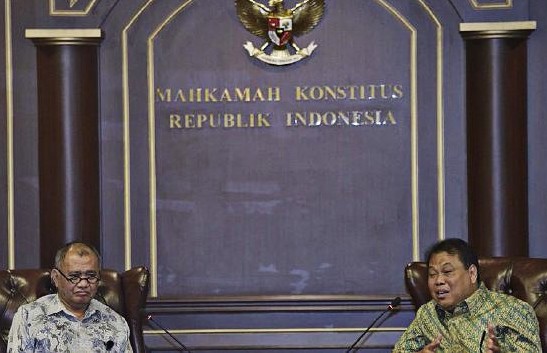Popular Reads
Top Results
Can't find what you're looking for?
View all search resultsPopular Reads
Top Results
Can't find what you're looking for?
View all search resultsTop court backs KPK in prosecuting firms
Change text size
Gift Premium Articles
to Anyone
A
fter years of deadlock in prosecuting cases involving corporations, the Corruption Eradication Commission (KPK) now has the confidence to start charging companies for graft after the Supreme Court issued a regulation shielding the antigraft body from any potential legal backlash.
A draft of the regulation has been prepared by both the KPK and the Supreme Court and it is expected that the highest court will sign off on it by the end of September in order for it to come into force by early October.
The KPK has often confronted a dilemma because Law No.20/2001 on Corruption already gives it this authority but the Criminal Code (KUHP) only recognizes people as proper subjects of criminal prosecution, not companies.
Thus, the Supreme Court regulation patches up this legal discrepancy between the law and the KUHP and it will protect the KPK from any lawsuits that question its decision to go after corporations.
The draft regulation covers procedures that the KPK and other law enforcement institutions can take in investigations and in naming suspects and bringing companies to court on corruption charges.
An official from a company will stand trial to represent the company and the sentence will come in the form of fines, not prison sentences, because the subject of the legal process is not a person.
KPK commissioner La Ode Muhammad Syarief said the regulation would also guide judges across the country in how they handle cases related to corruption committed by corporations, adding that it would also guide the KPK in how it seized assets belonging to corporations after a conviction had been attained.
In addition to fines, officials who commit corruption in service of their companies can also receive prison sentences.
“[With the regulation] judges will have a shared understanding on how to consider cases [on corporate corruption],” Syarief said.
The KPK has so far only prosecuted company officials who commit corruption with state officials for the benefit of their respective companies. The KPK has not yet charged corporations with corruption.
Around 90 percent of cases at the KPK involve companies. Charging companies and seizing their assets, according to the KPK, will produce a deterrent effect in the future.
A number of companies have been at the center of KPK investigations, but the KPK, prior to the existence of the regulation, has been reluctant to charge them. Some of these companies include the nation’s third-largest lender, Bank Central Asia (BCA), giant developers PT Sentul City, Agung Sedayu Group and Agung Podomoro Land, and the Lippo Group, a powerful business conglomerate operating in the country.
Supreme Court justice and spokesman Suhadi confirmed the establishment of the regulation and both parties, the antigraft body and the Supreme Court, expect that the regulation will be implemented by early October after the Supreme Court signs off on it in late September.
“The regulation can also be used in money laundering cases involving corporations,” Suhadi said, adding that both officials and companies could be punished at the same time under the regulation.
Suhadi said under the regulation, the KPK could charge a company with corruption after finding strong evidence that the money used to bribe state officials in order to receive a preferred policy came from the company.
“A company can also be charged if it is found that money from corruption offences was funneled to the company and even if the money has already been transformed into assets owned by the company. As for its officials, they can receive prison sentences and the company itself can receive fines as punishment,” Suhadi said.
Former Democratic Party treasurer Muhammad Nazaruddin, convicted of graft and money laundering, used around 30 companies to channel state projects worth trillions of rupiah every year between 2005 and 2011 for private gain and to those around him.
Meanwhile, graft and money laundering suspect Tubagus Chaeri Wardana allegedly used around 300 companies to siphon off money from state projects from the office of his sister, former Banten governor Ratu Atut Chosiyah, for years. Ratu has also been convicted for graft.
None of the companies used by Nazaruddin and Tubagus were prosecuted in the courts.
Furthermore, BCA also received benefits when former Supreme Audit Agency (BPK) chairman Hadi Poernomo, in his capacity as former director general for taxation between 2002 and 2004, unilaterally approved BCA’s request for income-tax leniency, a decision the KPK said had triggered around Rp 2 trillion in losses.
However, a controversial pretrial ruling lifted Hadi’s suspect status in May 2015, forcing the KPK to stop an investigation into the BCA case.










